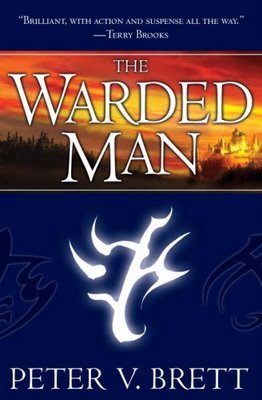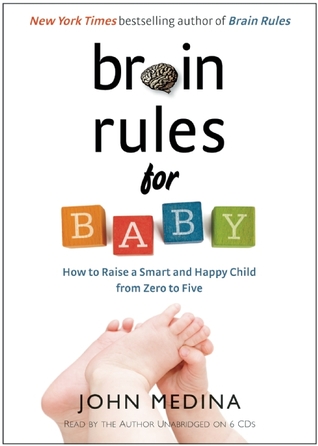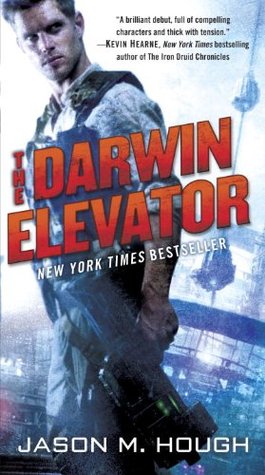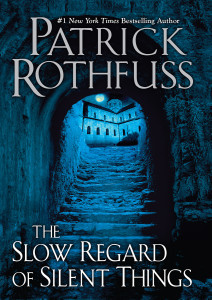It’s been a while since I posted a book review: I’ve been slightly distracted. But, I’ve still been reading, so here are some quick thoughts on what I’ve been reading.
The Warded Man
This is a pretty decent fantasy novel about a world where demons come out when the sun comes down. The demons can only be stopped by painting wards which create a sort of magical force field, so most people in this traditional European feudal-style fantasy world just cower in their homes at night and hope nothing messes up their wards. The story follows Arlen, a boy in a small village with a knack for warding who is sick of hiding from the demons; Rojer, a boy orphaned when demons killed his parents and adopted by a jongleur; and Leesha, a beautiful girl who is learning to be an “herb-gatherer” (doctor) from the old crone in her village. Through the course of the book they grow up and develop skills that will be needed to fight the demons, and Arlen in particular gets obsessed with it, tattooing himself all over with wards.
I mostly enjoyed this story and would have given it 4 stars if it weren’t for how it handled Leesha. I think the author tried to be feminist when he was writing this: In the big city, women have a lot of the positions of power in the government (though there’s still a Duke), and in the backwater villages it’s clear that we are supposed to be appalled by how women are treated poorly and valued mainly for their ability to make babies. But here’s the thing: it’s not that feminist to show us how bad it is for Leesha without also making her story have to do with more than her status as a sex object. And yet, just about every part of her story is driven by men’s lust for her and/or women’s warnings that she better start making babies soon. The last straw for me was (spoiler alert) when she and Rojer get ambushed on the road and, you guessed it, she gets raped. Then, not two days later, she has met Arlen, fallen in love with him, and they have passionate sex. Rape as a plot device is overused and lazy, and I have trouble believing that Leesha would want to be intimate with a strange man only a day or two after being gang raped. Call me crazy, but I think maybe she would need more time.
Anyway, other than that the book was mostly enjoyable, though clearly the beginning of a series. I’ll read the later books, but I hope the author gets better at handling women characters.
Brain Rules for Baby
With a newborn, I find I spend a lot of time laying on the couch with a baby napping on me. Perfect for reading a book about baby development! I liked this book a lot better than Happiest Baby on the Block. Although still sometimes simplified and cutesy, it also referred to actual studies and used technical terms when necessary. It’s an interesting book, but like other parenting books I found that most of its advice was pretty basic common sense. Some of the key points were:
- Empathy and understanding and managing emotions are key. It helps kids to have the words to name the emotions they’re feeling.
- Having friends is the key to happiness.
- Kids do best when rules are clear, fully explained, and consistently enforced. No “because I said so”. No spanking. Praise good behavior as well as punishing the bad.
- Praise effort, not intelligence.
Here’s a nice summary of the book. As you can see, even though there’s more to this book than “Happiest Baby on the Block”, it still boils down to a pretty concise list of advice.
The Darwin Elevator
This was a fun sci-fi action novel. The premise is that aliens have come to earth and built a space elevator that touches down in Darwin, Australia. At the same time, the planet has been infected with a disease that makes everyone go crazy, consumed by a single emotion until they’re essentially zombies. The only area where the disease can’t reach is the immediate vicinity of the elevator. So, the human race now is basically confined to Darwin and a series of huge space stations attached to the elevator. The space stations provide food to the people on the ground, and the ground provides air and water to the stations. The main characters are a rare group who are immune to the disease, so they make a living scavenging supplies from outside the protective aura of the elevator. When the elevator starts to malfunction, they get embroiled in the conflict between those on the ground and those in space.
This book has a little bit of everything: post-apocalyptic zombie fighting? Check. Political maneuvering? Check. Ragtag crew of misfits? Check. Decent science side to the sci-fi? Check (though this is by no means “hard” sci-fi). All in all, this one isn’t great literature but it was a fun read and I’ll probably pick up the sequel.
The Slow Regard of Silent Things
I loved this, even though it’s barely even a story. This is a novella about Auri, a minor character from The Name of the Wind. She is an odd girl who lives in the subterranean ruins beneath the college of magic. It’s basically a long vignette rather than a true story. Auri believes that all of the various knick-nacks that she owns have personalities and spends a lot of time placing them just so, so that object A isn’t jealous of object B, or so that object C has plenty of space. There’s a whole surprisingly engaging passage about making soap.
If it sounds weird, it is, but that’s what makes it so charming. It’s a great example of how good writing that puts you inside the character’s head can make you care about anything, even if you don’t fully understand it. You don’t have to understand, you just have to understand that it’s important to Auri. Also, in typical Rothfuss fashion, the prose is gorgeous. Plus, there is a lot of fun wordplay as well, including chemistry puns.
I would have enjoyed this in any case, but it will always hold a special place in my heart because it’s what we were reading on Christmas eve during a snowstorm while we sat by our 5-day-old baby’s bed in the NICU. Our lives had just been turned upside down but somehow everything felt just as it should be, and this book was part of that.
Snow Crash
I posted this quick review on Goodreads right after I finished this, but I’ll paste it here too:
This book has some really interesting glimpses of the future as it looked from the 90s, and at times some really nice turns of phrase, but ultimately fails because of its nonsensical plot and massive, boring, incoherent info dumps. It’s like the book was so concerned with showing off gee-whiz technology and bizarre ideas about how society will develop that it forgot that stories need to make sense. Also, the underlying premise is such a warped misunderstanding of how memes and computer programming and language work that I just couldn’t take it seriously.
I had a similar problem with Neuromancer: nice writing, cool vision of the future, but incomprehensible plot. Maybe cyberpunk just isn’t the genre for me.






Leave a Reply